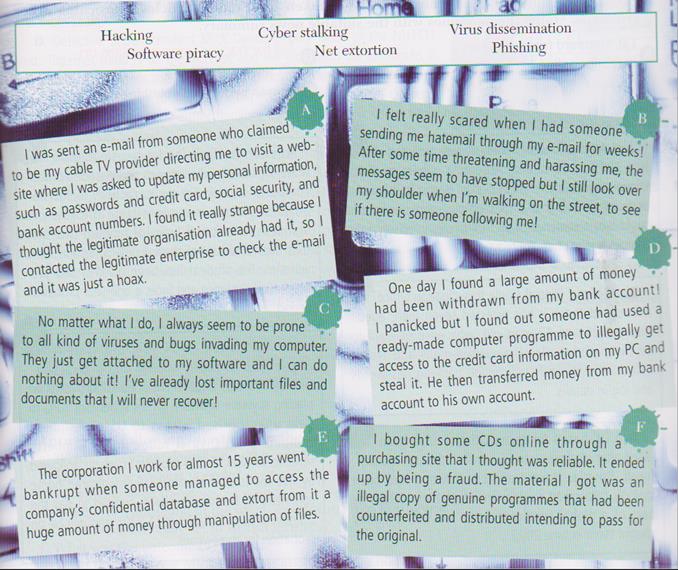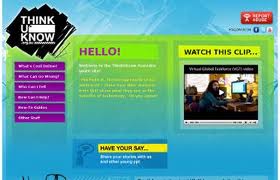A. Read the definitions below. Choose the one which best suites each word in bold in the text
a) eliminated; made invisible;
b) faults or defects in a system;
c) stored, processed and analysed by computer;
d) software programmes capable of causing great harm to files and computer programmes;
e) become connected;
f) a programmer who breaks into computer systems in order to steal, change or destroy information;
g) converted from normal language into a code.
1.  SPEAKING SPEAKING
According to you, does the Internet have the potential to make people’s lives easier, or is it as dangerous as the plot of the film may suggest? Not down your opinions and then compare your conclusions with those of your classmates.
 CYBER CRIMES CYBER CRIMES
Cyber crime consists of:
· Specific crimes dealing with computers and networks (such as hacking);
· the facilitation of traditional crime through the use of computers (Internet fraud);
· the use of computers by criminals for communication and document or data storage (“computer-supported crime”)
2.  READING: VICTIMS OF CYBER CRIMES READING: VICTIMS OF CYBER CRIMES
All of the following statements report stories of people who have been victims of cyber crimes.
Read the texts and identify the crime that was committed (choose from the ones in the box below)
Explain in your own words the meaning of the cyber crimes you have just identified.

SAFETY TIPS
There are some tips you should follow to protect yourself from online hackers. Match both halves of the sentences to build meaningful pieces of advice.
| 1. Use of the latest version of a good anti-virus software package
| a. which should combine upper and lower case characters.
| | 2. Use the latest version of
| b. for different websites.
| | 3. Don’t open e-mail attachments
| c. and do not go to websites from e-mail links.
| | 4. Confirm the sites you are doing business with
| d. which allows upgrading from the Internet.
| | 5. Create password containing at least 8 digits
| e. unless you know the source.
| | 6. Use different passwords
| f. only to secure sites.
| | 7. Send credit card information
| g. the operating system, web browsers and e-mail programmes.
|
Which of the security tips mentioned above do you follow?
4.  READING: SAFETY LESSONS READING: SAFETY LESSONS
Read the following article by Mark Prigg.

UK CHILDREN GET SAFETY LESSONS ON NET PREDATORS
Children will be given safety on the Net.
Every secondary school pupil in Britain is to be given Internet safety lessons, starting today.
They will see two hard-hitting video showing the effects of online grooming and abduction and receive safety talks and practical sessions.
It is hoped that about a million 11 to 16 –year-olds will attend the “ThinkuKnow” scheme being run by police, teachers and social services staff backed by the Home Office. The service will be run by the Child Exploitation and Online Protection Centre, which is backed by the Government and was set up in April 2006 to act as a point of contract for organizations investigating the abuse of children on the Net.
A website, www.thinkuknow.co.uk, has been set up where children can report instances of abuse to the police. It will give advice on blogs and news sites and there will be a range of online games. “The Government is determined to do everything it can to protect children from predatory paedophiles, including those who use the Internet and other communication technologies,” said Home Office Minister, Vernon Coaker.
 An overhaul of the law saw increased penalties for online paedophiles following the case of a former US marine who groomed a 12-year-old British girl on the Internet. He was jailed for four and half years by Manchester Crown Court in April 2004. An overhaul of the law saw increased penalties for online paedophiles following the case of a former US marine who groomed a 12-year-old British girl on the Internet. He was jailed for four and half years by Manchester Crown Court in April 2004.
Serial paedophile Douglas Lindsell, 62, also posed as a child in chatrooms to lure 72 young girls to his home in Twickenham, so he could molest them. He was jailed in 2003.
“Arming children and their parents with good, practical advice is crucial to winning the battle against child sex offenders,” said Mr. Coaker.
A. Find synonyms in the text for the following words:
a) consequences
b) go to
c) carried out
d) established
e) adjustment
f) essential
|